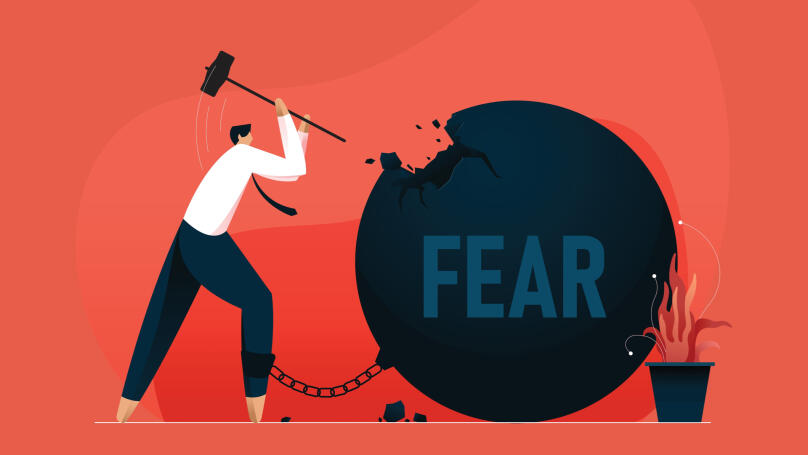"I'm afraid to start": how to manage fear and start a new business
We all love to imagine that one day we will build a new life: sign up for that long-awaited course, give our boss our letter of resignation, go to the gym, or even finally start our own business instead of being stuck in the office 24/7.

Although these fantasies persist as we await the "right moment" and become struck with fear even when we have a clear opportunity to change something. We will let you know why this happens and how you can overcome any of your fears and start realizing your dreams. You can learn more about this in our course "Say No to Your Fears. New Life and New Results".
Fear #1. Suspense

When we try something new, we don't know how these "experimentations" will turn out: maybe everything will go smoothly without hiccups, or we will have to overcome multiple challenges on our way. Unfortunately, it still seems quite daunting, right? Our brain often has a life of its own, and our imagination likes to wander. Therefore, when considering 1001 different outcomes where you can't exactly predict the outcome, we feel afraid. As a rule, this anxiety comes from the desire to control anything and everything. We have an involuntary urge to save our internal resources as much as possible. As a result, your brain doesn't want you to spend much time achieving a goal. Suppose there's no guarantee that you will accomplish this goal quickly (or even at all). In that case, this fear can intimidate you with the unknown and discourage you from any action.
There are several ways to work through this block, such as:
- Reading a few autobiographies or interviews of people that started from the same place as you. Try to compare your life paths but do not focus on your differences. Instead, concentrate on similarities. How did that person act in similar situations? What mistakes did they make? When and how did they achieve their first-ever results? What emotions did they experience? Try to find a hero, and the unknown will feel like a field of opportunity. What if you also become extremely rich or even a star?
- Try the scripting technique. First, take a piece of paper and write down the worst-case scenario that might happen if you did start something new. Then take another piece of paper and write the best-case scenario, which should be amazing! Finally, you have to write down a more realistic scenario on the third sheet of paper, which is the middle ground between the first and second scenarios that you've already written down. This represents the most likely outcome. And it doesn't look as scary as you might have imagined, right?
You now know how your situation could turn out, and you won't be taken by surprise. So, you are ready to act.
Fear #2. Condemnation of society

"What will people say…" - how often have you heard this phrase from relatives or even used it yourself? As a rule, it's about stereotypes, which, fortunately, are gradually becoming outdated. However, because of these stereotypes, many are afraid to quit their jobs when they are 50, sign up for ballet at 30, travel at 20, or even go to the movies on their own. The phenomenon of the fear of someone else's opinion has a term in psychology - the "spotlight effect", which means this feeling that everyone around is discussing you feels like you are standing in a spotlight.
Thomas Gilovich from Cornell University described this feature of human psychology. To conduct an experiment, he asked his students to come to his lecture wearing a T-shirt with a picture of Barry Manilow (a singer who is unpopular with American youth). Gilovich then asked the students how many people they thought had noticed their T-shirts. The analysis indicated that the students overstated the attention of others by 23%.
What can you do to ensure that the opinions of others won't bother you? First, determine who these people are and ask yourself, "what will they think." Most likely, you have someone in mind. Next, make a list of the people who came to your mind and then reread it. You will probably find that 90% of the people on your list are people whose opinions you really don't care about. So why do you even think about them anyway?
To determine the circle of "your people" who can support you in any new endeavor, complete this simple exercise:
- Write a few statements describing the task that you are afraid to tackle. For example, if your dream is to open a bakery, your message could be, "I bake delicious cakes."
- Create a list of people who are most likely to agree with this statement.
- Then, create a list of people who might try to challenge it.
- Afterward, ask yourself some questions (preferably also in writing):
Which people on your list do you like best?
Who do you respect the most?
Who can boast of having an active, happy, and fulfilling life?
Who has a more powerful reputation in society?
Who are you likely to trust with your secrets?
Who is most likely to hurt you or behave in a way you would prefer to ignore?
Why should you pay attention to the people on the second list?
Once you have a better idea about the people around you, you will know whose opinion you respect, and then the phrase "What will people think" won't matter to you. Chances are, you'll even find that the vast majority of people who mean something to you will support your venture. You can then choose whose opinion to take into consideration or even if you need to do it!
Lectera’s Online Courses by topic
Fear #3. Mistakes and failures

It would be more accurate to call this fear "perfectionism" because it is the culprit behind the fear of making mistakes. What could make you more imperfect than making mistakes? The sociologist Thomas Curren recognized a sharp increase in perfectionism in society over the past 25 years, especially amongst younger people, which might be the result of the "adoration of perfection" bought by social networks (for example, Instagram, where everyone posts only their best photos and their best life.) It leads to three types of perfectionism simultaneously:
- Self-directed perfectionism ("I'll be the best I can be.")
- Forced perfectionism ("I feel that others want me to be perfect.")
- Perfectionism directed at others ("Every demand I make has to be fulfilled by others perfectly.")
How does this affect your life in particular? Let's take an example from the same bakery: your imagination already sees lines at the door, and you even get invited to a cooking show. Then perfectionism kicks in, and your imagination throws up opposite images: people walking around the bakery and laughing because you make wonky roses from cream cheese, causing your bakery to go bankrupt immediately. Thus, you don't have the normal options of making mistakes and fixing them. Instead, it's either a success or a complete failure.
The writing method we recommended above for fear of the unknown can also help you in this situation. It's also worth trying the following advice:
- Look at mistakes as a natural part of any process. Your objective in any business is not to avoid the mistakes but to work them out, recognize, analyze, and correct them. This is exactly what we all do on this planet.
- Focus on the process itself. Enjoy it, and don't chase results.
- Lower the bar. If you can't skip a workout because your inner critic will harass you for wanting to stay in bed that day, then replace your workout with a 20-minute home workout. Why not compromise?
- Follow the "good enough" principle. Sometimes it's better to launch a business on time, even if it's not perfect than to work on it over several years and be behind market trends.
How to overcome fear when you are not sure what's causing it

You are afraid to start a new business but don't know why. The unknown is not scary, the opinions of others don't matter, and you do not suffer from perfectionism. No matter what the real reason is, do this exercise:
- On paper, write down the business you are having problems starting.
- Write down the worst thing that could happen if you did.
- Then answer a few questions:
How can you avoid this outcome?
How to fix the situation if this problem does happen?
How will this affect your life?
What happens if the problem doesn't happen and you succeed?
What happens if you never do it?
When you engage in this process, you will discover the balance of advantages and disadvantages and your true motives and desires. First, however, simultaneously, don't forget the following:
- Don't deny fear. There is nothing wrong with being afraid of change - most people are affected by this because we all value stability and comfort.
- Voice your concerns to your family, friends, or a psychologist. When we say something aloud, our problems and thoughts sound entirely different than in our heads, and you can become aware of their absurdity.
- Recognize that there is no such thing as a hopeless situation. However, no matter how your venture ends, it brings you new experiences and many other resources.
- Make sure you really want to start your business. Your goal must belong to you and is not influenced by someone else.
- Break the process down into small steps. You don't have to immediately announce that "Tomorrow I will start a business!" Instead, begin by registering your business name, taking a related course, creating a business social media page, etc. That way, you will make sure that everything happens gradually and smoothly.
Please note that, as a rule, change is far easier for children: they never doubt their success, never worry about others, and are not afraid that the results could turn out differently. On the other hand, adults have a wealth of experience, including negative ones, psychological traumas from the past, and developed social ties in society. All these things, of course, impact our motivation and determination. Still, a confident and psychologically stable person easily overcomes all these issues. However, if you still can't cope with indecision and want to finally change your life, don't forget to take our course "Say No to Your Fears. New Life and New Results". You will discover how to manage stress when inviting change into your life, remain calm, protect your personal space, and maintain a resourceful state.
Share this with your friends via:
Latest News

In the UK, £23 million has been allocated for the expansion of the EdTech Testbed program — pilots of educational technologies in schools and colleges.

In the US, Tuskegee University announced the launch of Tuskegee University Global Campus (TUGC) — a new online platform for distance learning.

A significant stage in the development of the alternative education system has begun in West Northamptonshire in the UK: the County Council is actively calling on parents, guardians, and trustees to participate in shaping the future of this key area.

Outwoods Primary School in Atherstone, Warwickshire, having experienced deep sadness after the loss of their famous cat, Silla, has found solace in a new pet – a Maine Coon named Aloysius O’Hara.

In modern universities, artificial intelligence, and in particular ChatGPT, is rapidly transforming from a controversial tool into a full-fledged student assistant.












 Spring skills audit: what to remove, strengthen, and “sow” in learning
Spring skills audit: what to remove, strengthen, and “sow” in learning
 9 Career Mistakes Young Professionals Make
9 Career Mistakes Young Professionals Make
 £23 million allocated for the expansion of EdTech Testbed in the UK
£23 million allocated for the expansion of EdTech Testbed in the UK
 Test: How Psychologically Mature Are You? Check Your Inner Foundation.
Test: How Psychologically Mature Are You? Check Your Inner Foundation.
 Test. Check Your Social Media Dependency Level!
Test. Check Your Social Media Dependency Level!
 Test: What Business is Right For You?
Test: What Business is Right For You?
